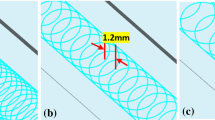Abstract
In this work, two models of feed forward back-propagation neural network (FFBP-NN) and adaptive neuro-fuzzy inference system (ANFIS) have been developed to predict the performance of magnetic abrasive finishing process, based on experimental data of literature [7]. Input parameters of process are electromagnet’s voltage, mesh number of abrasive particles, poles rotational speed and weight percent of abrasive particles, and also the output is percentage of surface roughness variation. In order to select the best model, a comparison between developed models has been done based on their mean absolute error (MAE) and root mean square error (RMSE). Moreover, optimization methods based on simulated annealing (SA) and particle swarm optimization (PSO) algorithms were used to maximize the percent of surface roughness variation and select the optimal process parameters. Results indicated that the models based on artificial intelligence predict much more precise values with respect to predictive regression model developed in main literature [7]. Also, the ANFIS model had a lowest value of MAE and RMSE with respect to others. So it was used as an objective function to maximize the surface roughness variation by using SA and PSO. Comparison between the obtained optimal solutions and analysis of results in main literature indicated that SA and PSO could find the optimal answers logically and precisely.
Similar content being viewed by others
References
H. El-Hofy, Advanced machining process, Mc-GrawHill series (2005).
D. K. Singh, V. K. Jain and V. Raghuram, Parametric study of magnetic abrasive finishing process, Journal of Materials Processing Technology 149 (2004) 22–9.
S. Yin and T. Shinmura, Vertical vibration-assisted magnetic abrasive finishing and deburring for magnesium alloy, International Journal of Machine Tools & Manufacture 44 (2004) 1297–303.
G. W. Chang, B. H. Yan and R. T. Hsu, Study on cylindrical magnetic abrasive finishing using unbounded, International Journal of Machine Tools & Manufacture 42 (2002) 575–83.
S. Mirian, M. Safavi, A. Fadaei, M. Salim and M. Farzin, Improving the quality of surface in polishing process with the magnetic abrasive powder polishing (MAPP) by use of ultrasonic oscillation of work-piece on a CNC table, International Journal of Precision Engineering and Manufacturing 12(2) (2011) 275–84.
H. Yamaguchi and T. Shinmura, Internal finishing process for alumina ceramic components by a magnetic field assisted finishing process, Precision Engineering 28 (2004) 135–42.
R. Mulik and P. Pandey, Magnetic abrasive finishing of hardened AISI 52100 steel, Int J. Adv Manuf Technology 55(5–8) (2011) 501–15.
S. D. Mun, Micro machining of high-hardness materials using magnetic abrasive grains, International Journal of Precision Engineering and Manufacturing, 11(5) (2010) 763–70.
R. S. Mulik and P. M. Pandey, Ultrasonic assisted magnetic abrasive finishing of hardened AISI 52100 steel using un bonded SiC abrasives, Int. Journal of Refractory Metals and Hard Materials 29 (2011) 68–77.
J. H. Oh and S. H. Lee, Prediction of surface roughness in magnetic abrasive finishing using acoustic emission and force sensor data fusion, Journal of engineering manufacture, 225(6) (2011) 853–65.
S. Singh and H. S. Shan, Development of magneto abrasive flow machining process, International Journal of Machine Tools & Manufacture 42 (2002) 953–9.
D. K. Singh, V. K. Jain and V. Raghuram, Experimental investigations into forces acting during a magnetic abrasive finishing process, Int J Adv Manuf Technol, 30 (2006) 652–662.
R. S. Mulik and P. M. Pandey, Experimental investigation and optimization of ultrasonic assisted magnetic abrasive finishing process, Journal of engineering manufacture; first published on July 22, (2011).
S. O. Kim and J. S. Kwak, Magnetic force improvement and parameter optimization for magnetic abrasive polishing of AZ31 magnesium alloy, Transaction of nonferrous metals society of china 18 (2008) 369–73.
M. T. Hagan, H. B. Demuth and M. Beale, Neural network design, Boston: PWS Publishing Company; (1996).
J. S. R. Jang, ANFIS: Adaptive-network-based fuzzy inference system, IEEE Transactions on Systems, Man and Cybernetics 23 (1993) 665–85.
S. S. Rao, Engineering optimization: theory and practice. New Jersey: John Wiley & Sons, 4 (2009) 702–714.
Author information
Authors and Affiliations
Corresponding author
Additional information
Recommended by Associate Editor Dae-Cheol Ko
Reza Teimouri is an MSc graduate of mechanical engineering in Babol University of Technology in Iran.
Hamid Baseri is an assistant professor of mechanical engineering in Babol University of Technology in Iran. He has ten years experience in manufacturing research. The subjects of his interest include machining process and intelligent technologies.
Rights and permissions
About this article
Cite this article
Teimouri, R., Baseri, H. Artificial evolutionary approaches to produce smoother surface in magnetic abrasive finishing of hardened AISI 52100 steel. J Mech Sci Technol 27, 533–539 (2013). https://doi.org/10.1007/s12206-012-1210-0
Received:
Revised:
Accepted:
Published:
Issue Date:
DOI: https://doi.org/10.1007/s12206-012-1210-0




